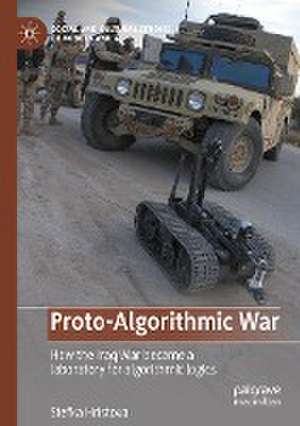Proto-Algorithmic War: How the Iraq War became a laboratory for algorithmic logics: Social and Cultural Studies of Robots and AI
Autor Stefka Hristovaen Limba Engleză Paperback – 17 iul 2023
This book details the emergence of a nascent algorithmic war culture in the context of the Iraq War (2003-2010) in relation to the data-driven early 20th century British Mandate for Iraq. Through a series of five inquiries into the ways in which the Iraq War attempted to and often failed tosee population and territory as digital and further proto-algorithmic entities, it offers an insight into the digitization and further unmanned automaton of war. It does so through a comparative historical framework reaching back to the quantification techniques harnessed during the British Mandate for Iraq (1918-1932) in order to explicate the parallels and complicated the diversions between the numerical logics that have driven both military state-building enterprises.
| Toate formatele și edițiile | Preț | Express |
|---|---|---|
| Paperback (1) | 774.97 lei 6-8 săpt. | |
| Springer International Publishing – 17 iul 2023 | 774.97 lei 6-8 săpt. | |
| Hardback (1) | 780.06 lei 6-8 săpt. | |
| Springer International Publishing – 17 iul 2022 | 780.06 lei 6-8 săpt. |
Preț: 774.97 lei
Preț vechi: 945.09 lei
-18% Nou
Puncte Express: 1162
Preț estimativ în valută:
148.30€ • 158.57$ • 123.64£
148.30€ • 158.57$ • 123.64£
Carte tipărită la comandă
Livrare economică 18 aprilie-02 mai
Preluare comenzi: 021 569.72.76
Specificații
ISBN-13: 9783031042218
ISBN-10: 3031042212
Pagini: 180
Ilustrații: XIII, 180 p. 4 illus.
Dimensiuni: 148 x 210 mm
Greutate: 0.24 kg
Ediția:1st ed. 2022
Editura: Springer International Publishing
Colecția Palgrave Macmillan
Seria Social and Cultural Studies of Robots and AI
Locul publicării:Cham, Switzerland
ISBN-10: 3031042212
Pagini: 180
Ilustrații: XIII, 180 p. 4 illus.
Dimensiuni: 148 x 210 mm
Greutate: 0.24 kg
Ediția:1st ed. 2022
Editura: Springer International Publishing
Colecția Palgrave Macmillan
Seria Social and Cultural Studies of Robots and AI
Locul publicării:Cham, Switzerland
Cuprins
Chapter 1: Algorithmic Logics and War.- Chapter 2: Data Lands/Data Subjects.- Chapter 3: Taxonomies Of Enmity.- Chapter 4: Data Replay.- Chapter 5: Veridiction Training.- Chapter 6: Automation, Trust, Responsibility.- Chapter 7: Conclusion: Beyond War.
Notă biografică
Stefka Hristova’s research examines algorithmic and digital media cultures. She studies the intersection of technology and culture in relation the context of photography, surveillance, and social movements.
Textul de pe ultima copertă
During the Iraq War, American soldiers were sent to both fight an enemy and to recover a “failed state” in pixelated camouflage uniforms, accompanied by robots, and armed with satellite maps and biometric hand-held scanners. The Iraq War, however, was no digital game: massive-scale physical death and destruction counter the vision of a clean replayable war. The military policy of the United States, and not the actual experience of war, has been rooted in the logic of digital, and nascent algorithmic technology. This logic attempted to reduce culture, society, as well as the physical body and environment into visual data that lacks cultural and historical context.
This book details the emergence of a nascent algorithmic war culture in the context of the Iraq War (2003-2010) in relation to the data-driven early 20th century British Mandate for Iraq. Through a series of five inquiries into the ways in which the Iraq War attempted to and often failed to see population and territory as digital and further proto-algorithmic entities, it offers an insight into the digitization and further unmanned automaton of war. It does so through a comparative historical framework reaching back to the quantification techniques harnessed during the British Mandate for Iraq (1918-1932) in order to explicate the parallels and complicated the diversions between the numerical logics that have driven both military state-building enterprises.
Stefka Hristova’s research examines algorithmic and digital media cultures. She studies the intersection of technology and culture in relation the context of photography, surveillance, and social movements.
Stefka Hristova’s research examines algorithmic and digital media cultures. She studies the intersection of technology and culture in relation the context of photography, surveillance, and social movements.
Caracteristici
Details the emergence of a nascent algorithmic war culture in the context of the Iraq War Offers insights into the digitization and unmanned automaton of war Uses comparative historical frameworks to illuminate the genealogies of the algorithmic logics in warfare









